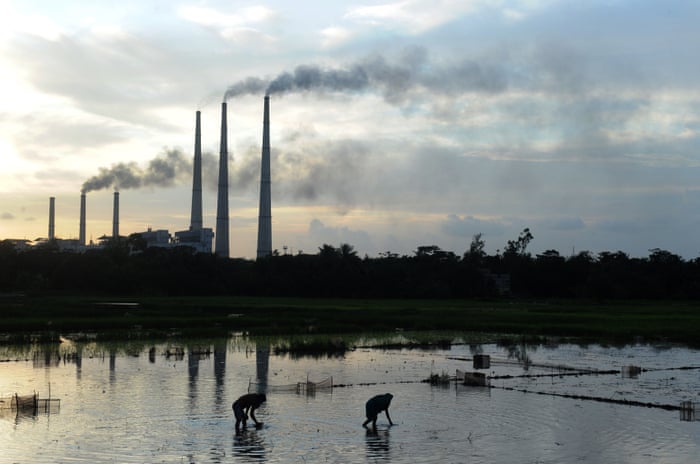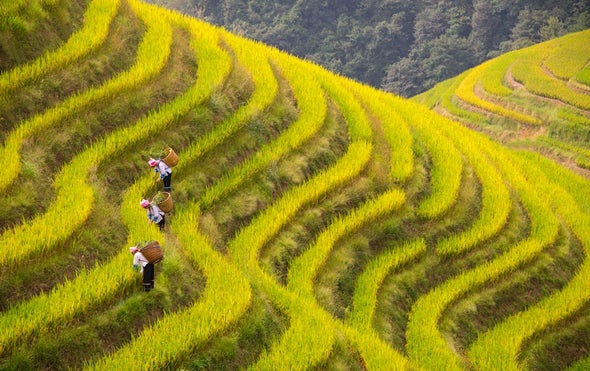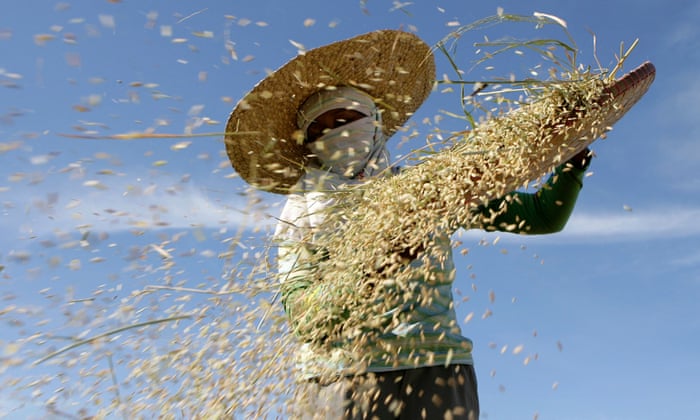The Staff of Life
 |
| Indian labourers planting rice in front of Kolaghat Thermal Power Plant, 85km south-west of Kolkata. Photograph: Dibyangshu Sarkar/AFP/Getty Images |
"Rice is not just a major source of calories, but also proteins and vitamins for many people in developing countries and for poorer communities within developed countries."
Kazuhiko Kobayashi, study co-author, University of Tokyo
"[Nutritional deficiencies] can directly impact on [cognitive development, metabolism, and immune system] and indirectly [obesity, Type 2 diabetes mellitus] affect human health on a panoptic [pandemic] scale."
"[irrespective of location, crops grown in higher C02 environments were less nutritious], containing about ten percent less protein, 8 percent less iron, and 5 percent less zinc than rice grown under current levels of carbon dioxide."
Study researchers
/cdn.vox-cdn.com/uploads/chorus_asset/file/11369283/170893.JPG) |
"We still don't understand why some plant genotypes show a bigger response to higher levels of carbon dioxide."A major study published last month in in Science Advances, concludes that rice, one of the world's food staples, is destined to become infinitely less nutritious with the rise of C02 levels in a warming atmosphere projected for the second half of this century. A precipitous drop in essential nutrients such as protein, zinc, iron, and various B vitamins was found by researchers in Japan, pointing out the "devastating effects" that would result on health mostly in South-east Asia where an estimated 600 million people are reliant on the grain for some fifty percent of their daily calories and protein.
"That's important [to know] if we want to move from understanding the problem to solving it."
Andrew Leakey, crop biologist
Simply because over two billion people on the planet are hugely dependent on rice as a primary food, where 90 percent of the world's rice eaters are located in Asia, it made good sense for research on C02 food-crop effects to focus on rice. "Anything that impacts rice in terms of its nutritional quality is going to have an impact", emphasized study co-author Lewis H. Ziska.
 |
| Credit: Nancy Brown Getty Images |
For the study, the researchers made use of an "open-field method" in paddy fields located in China and Japan to proceed with analyzing the impact of climate change on 18 different rice varieties. Their study concluded that irrespective of the location of the rice paddy, all crops were less nutritious as a result of being grown in a higher C02 atmosphere. "These results indicate that the role of rising CO2 on reducing rice quality may represent a fundamental, but underappreciated, human health effect associated with anthropogenic climate change", the researchers wrote.
All of the various rice types showed a drop in vitamins B1, B2, B5 and B9; adversely containing a greater amount of vitamin E than rice grown at the present time. Soaring levels of C02 have been linked in previous studies to reduced protein content and increased carbohydrates in barley, potatoes, rice and wheat, a situation that Irakli Loladze -- "math biologist" -- likened to the "junk-food effect".
 |
| A farmer sifts rice in the Philippines: A drop in the nutritiousness of rice could have profound health effects. Photograph: Cheryl Ravelo/Reuters |
Labels: Agriculture, Asia, C02, Climate Change, Environment, Food, Nature, Rice

0 Comments:
Post a Comment
<< Home